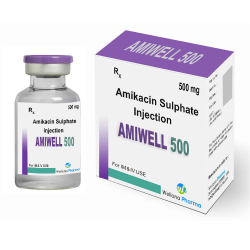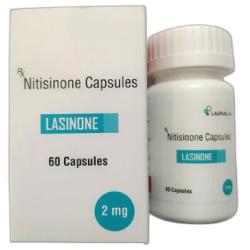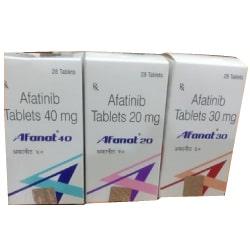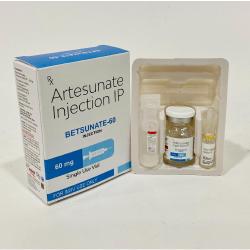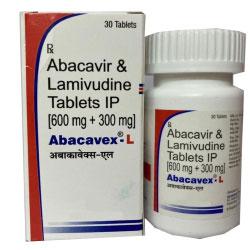Description
Amikacin Sulphate 500mg Injection is one of a group of antibiotic medicines known as aminoglycosides. It is used for the short-term treatment of serious infections due to susceptible strains of Gram-negative bacteria, including Pseudomonas species, species of indole-positive, and indole-negative Proteus, Escherichia coli, Providencia species, Klebsiella-Enterobacter-Serratia species, and Acinetobacter (Mima-Herellea) species.
Dosage and Side Effects
The recommended dose of amikacin for adults and children over 12 years is 15 mg/kg daily administered as a single dose or divided into 2 equal doses of 7.5 mg/kg administered every 12 hours. The usual dose for Children up to 12 years is 15-20 mg/kg of body weight once daily or divided into two equal doses of 7.5 mg/kg which is administered every 12 hours. The initial dose for neonates is 10 mg/kg of body weight followed by 7.5 mg/kg every 12 hours. The recommended dosing in premature babies is 7.5 mg/kg every 12 hours. Amikacin may be administered once or twice daily and is usually either by the intravenous (IV) or intramuscular (IM) route.
The most common side effects of Amikacin Sulphate are headache, skin rash, fever, low blood pressure, numbness and tingling, vomiting, tremors, nausea, joint pain, anemia, diarrhea, low blood magnesium, dizziness, and hearing loss.
FAQ's
What is Amikacin Sulphate?
Amikacin is an antibiotic therapeutic drug used for the treatment of a wide range of bacterial infections.
What dosage strength Amikacin is supplied?
Amikacin is supplied in the form of injection and 500 mg/2mL dosage strength.
How is Amikacin administered?
Amikacin can be administered intravenously (into a vein) or intramuscularly (into a muscle).
How much does Amikacin cost in India?
Amikacin cost in India is very reasonable and can vary. To procure it legally, you can call us at (+91) 8130290915, TOLL-FREE: 1800-889-1064, Or Write us at info@indiangenericmedicines.com.
Where can I get Amikacin at the best Price?
Order Amikacin at the best price today. We request you to Call/WhatsApp us at (+91) 8130290915 or dial our TOLL-FREE Number: 1800-889-1064 or Write us at info@indiangenericmedicines.com. We are fully committed to providing you with the best Amikacin price from India. That is why we’ll match the price of any other existing facilitators/suppliers/distributors in the market who require a medical prescription.
Is Amikacin available in India?
Amikacin is a (prescription drug, doctor-prescribed medication, or health care professional-prescribed medicine) pharmaceutical drug that can be legally dispensed against a medical prescription. Amikacin can be made available through the network of authorized distributors in India. (Mumbai, Ahmedabad, Kolkata, Hyderabad, Bangalore, Chennai, Delhi, Pune, etc.).
Can You Send the Amikacin to Foreign Destinations?
Buy generic Amikacin online at the best/lowest price from a leading supplier. Indian Generic Medicines (IGM) can assist in the delivery of Amikacin; the doctor-prescribed medication to Saudi Arabia, the UK, South Africa, Canada, Australia, Philippines, the USA, Thailand, China, Kazakhstan, Uzbekistan, Zambia, Sri Lanka, Pakistan, Kuwait, Turkey, Sweden, Hong kong, UAE, Afghanistan, Malaysia, Singapore, Qatar, Nepal, Japan, and many other countries.
What is the procedure to buy Amikacin from Indian Generic Medicines?
Patients can fill out the order form or send mail to info@indiangenericmedicines.com. Patients can also send WhatsApp messages to +91 8130290915 or can dial the TOLL-FREE Number: 18008891064. We will reply ASAP with the details of the Amikacin 500mg/2mL price as well as the procurement procedure.
Note:- The order will be confirmed only after the valid receipt of the prescription from the Physician.
Is it safe to buy Amikacin online from India?
Yes, one can buy Amikacin online from India-based Indian Generic Medicines if it is not (yet) registered or is unavailable in their respective country. We can facilitate the supply/export of Amikacin through legal channels.

